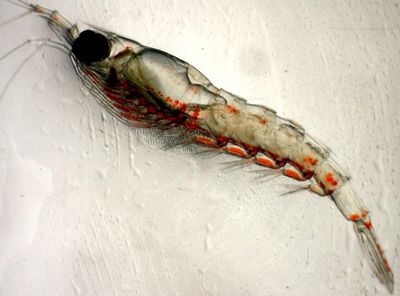Feds ban krill fishing to save it for whales
NOAA rule extends 200 miles off coast

No one fishes for krill off the West Coast, and federal fisheries managers want to keep it that way so the tiny shrimp-like creatures remain as plentiful as possible as food for whales, salmon and seabirds.
NOAA Fisheries Service on Monday issued a final rule barring krill fishing inside the 200-mile limit in the Pacific off California, Oregon and Washington.
Krill are taken primarily off Antarctica, where scientists have raised concerns the fishery has upset the food web, making life tougher for penguins and other marine life.
A smaller fishery has been going since the 1970s off British Columbia.
The catch is processed into food for salmon farms, as well as home aquariums, and an oil consumed by people.
The idea to save krill for marine life originally came from managers of the national marine sanctuaries off California, who became concerned in 2003 after rockfish populations declined, and later in 2005 when a downturn in krill populations was blamed for starving sea birds and other West Coast marine life.
“Krill is a critical prey for a huge number of vertebrate species there,” including whales, salmon and rockfish, said William Douros, NOAA’s West Coast regional director of marine sanctuaries.
The Pacific Fishery Management Council sets ocean fishing limits, and staffer Mike Burner said they shared the sanctuary managers’ concerns.
The council has had to severely cut back harvests of rockfish and salmon, both of which depend on krill for food, and it made no sense to further reduce that food supply by opening a new fishery, Burner said.
The decision was praised by environmentalists as a new approach to fisheries management based on maintaining the overall health of an entire ecosystem, rather than just focusing on population numbers of one species at a time.
“It’s proactive and precautionary taking action now before there is a crisis, rather than waiting for a big problem to occur and then having to deal with it,” said Oceana spokesman Ben Enticknap.